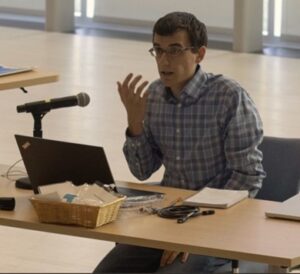Current Music Theory Students
The following are students who are currently enrolled in the CUNY Graduate Center Music Theory Program.
Annie Beliveau is a vocalist, composer, and theorist interested in the vocal music of Bulgaria and Nigeria. She most recently presented “Haunting the Cutscene: Bulgarian Choral Music in Video Games at the Turn of the Millennium” at the virtual Fresh Science Conference. She has taught ear training at City College and has been a guest teaching artist with the 92nd Street Y and the Abrons Art Center. Annie performs professionally as a singer with Choral Chameleon and with Yasna Voices, the New York Bulgarian Women’s Choir. She has given lecture-recitals at Columbia University and at Middlebury College in Vermont, where she earned her undergraduate degree. Other research interests include medieval chant theory, the history of teaching counterpoint, and nineteenth-century French music.
Tlacaélel (“Tlaca”) Cáceres is a music theorist and singer with degrees from Juarez University of Durango and the University of Veracruz. He studied singing with Nimbe Salgado and music theory with composers Arnoldo Vázquez and Emil Awad. His favorite activity is analysis, and he is particularly interested in Schenkerian Analysis and post-tonal theory. His master’s degree thesis is devoted to analyzing Davidovsky’s Synchronism No. 6, applying Klumpenhouwer Networks and O’Donnell’s Dual Transformation. In 2024, he delivered a presentation as part of the Festival Internacional Camerata 21, sponsored by the Universidad Veracruzana. In addition to twelve-tone music, Talaca also loves Mexican and South American folk music and trova.
Hang Ki Choi is a music theorist and mezzo-soprano from Hong Kong. She served as an adjunct faculty member at the Hong Kong Baptist University, teaching music theory, ear training, and tonal/post-tonal analysis. In addition to her teaching experience, she was also a research assistant at the Chinese University of Hong Kong, examining the impact of Zoom pedagogy on music and history undergraduates during the COVID era. Outside of work, she has conducted pre-concert talks for the public as part of an educational outreach program in Hong Kong. She holds an M.M. degree from the Mannes School of Music and a B. S. degree in Applied Psychology from New York University. At Mannes, she was awarded the Felix Salzer Techniques of Music Award for outstanding achievement in her studies. At the 2024 SMT meeting, she co-delivered a presentation with Prof. Joseph Straus. Combining her experience in psychology and music theory, Hang Ki is interested in understanding the impact of memory, emotion, and anticipation on the listener’s perception of form and phrase structure.
Erin Johnston is a music theorist and a vocalist with degrees from Vanier College and McGill University. She has taught music theory and ear training at McGill and CCNY. Her areas of interest include the study of classical form, romantic harmony, narrativity and musical meaning, integral serialism, and music pedagogy. She has delivered presentations on the symphonies of Gustav Mahler at various conferences in the US and Canada, including those run by South Central Society for Music Theory, the Music Theory Society of New York State, and at Western University’s Graduate Symposium on Music. Erin has also co-presented (with Jong Wook Song) at the Music Informatics & Music Theory Pedagogy Interest Groups’ joint session at the 2023 AMS/SMT meeting, and she delivered a presentation at the 2023 Teaching Music History conference.
Christina Lee has degrees in music theory and piano from Mannes College, where she was named a Presser Scholar and received the Felix Salzer Techniques of Music Award. She has taught music theory and ear training at Mannes College, NYU, Hunter College, and Montclair State University. She currently is working on a dissertation on cadence, melody, and harmony in Hindemith’s piano sonatas, and she is currently a Full-time Music Theory and Analysis Faculty member at Juilliard.
Rebecca Moranis is a music theorist and flutist. She holds degrees in music theory and flute performance (minor in mathematics) from the University of Toronto, and her research interests include timbre and memory, spanning contemporary and 20th-century analysis, music cognition, and computational music theory. She co-authored “Rhythm Contour Drives Musical Memory” published in Attention, Perception, & Psychophysics (2023), and in 2023 she presented at the MTSNYS, NECMT, ACTOR Y5, Timbre 2023, and Fresh Science conferences. She also co-presented talks with Joseph Straus at the 2023 SMT conference and McGill’s ACTOR/CIRMMT Symposium, and with Johanna Devaney at the 2024 SMT conference. Her research is supported in part by a Doctoral Fellowship from the Social Sciences and Humanities Research Council (SSHRC) of Canada. She teaches music theory at Hunter College and previously taught music theory and math at the University of Toronto. Rebecca has been a member of Barbara Hannigan’s Equilibrium Young Artists since 2021, received her ARCT in Piano Performance from the Royal Conservatory of Music, and danced ballet professionally with Opera Atelier for eight years.
Demi Danielle Nicks, a graduate of Stetson University and Florida State University, is a music theorist with a background as a vocalist and composer. She has taught music theory and aural skills at FSU and Hunter College. Her scholarly interests include musical narrative and examining works by Györgi Ligeti, Igor Stravinsky, and Lili Boulanger through the lens of trauma and disability studies. She has presented talks at regional conferences on the music of Ligeti and is a member of the SMT Committee on Accessibility and Disability. Among other honors, she has been the recipient of the Presser Scholar Award and the Doris Williams Davis & William McClure Davis Endowed Award.
Nathan Pell, a graduate of Princeton University and Mannes College, has taught at Queens College, Mannes, and William Paterson University. A cellist, composer, conductor, and music theorist, he has published an article on Brucker in Music Theory Online and has given many presentations at national, international, and regional conferences on the topics of intersections between music analysis and performance. In connection with the SMT Performance and Analysis Interest Group, which he co-chairs, he has launched a discography of underrepresented classical performers. He is currently working on a dissertation entitled “Repetition and Division in Tonal Music.”
Vlad Praskurnin is a music theorist with a background in classical guitar performance. His research interests span the 16th to 18th centuries, and they include schema theory, form, historical pedagogy, and improvisation, among others. He has presented his research at the joint AMS/SMT 2023 conference, the 2022 Galant Schema Studies conference, conferences organized by the Citations: Renaissance Imitation Mass (CRIM) Project, at the SMT 2024 conference, and elsewhere. Involvement in the CRIM project resulted in a Master’s Thesis, supported by a SSHRC Canadian Graduate Scholarship, on Orlando di Lasso’s Chanson-Masses. He earned M.A. and B.Mus. degrees in Music Theory at McGill University.
Ben Schweitzer is a music theorist and composer, originally from Massachusetts. He studied composition with Salvatore Macchia at the University of Massachusetts Amherst and music theory at Queens College, CUNY, where he wrote a thesis on Mahler’s Sixth Symphony. His interests include modernism, post-tonal theory, and Japanese music of the 20th and 21st centuries. He has presented papers at the conferences of Fresh Science, Music Theory Society of New York State, and the Society for Music Theory, analyzing Japanese music in terms of the links between their post-tonal language and Japanese aesthetics. Ben also enjoys photography, reading, and being outside in nature.
Jiyeoung Sim is a music theorist whose interests focus on the aesthetical properties of music and how they can be algorithmically generated in the Post-human Era. Her primary areas of interest include Computational Creativity, AI-generated composition, and Digital Musicology. She received a fellowship from Seoul National University for her master’s thesis proposal and won the 11th Young Musicologist Award from the Musicological Society of Korea for her master’s thesis. She has served as an Administrative Assistant and teaching assistant in musicology major classes in the Department of Musicology at Seoul National University. She has published numerous book chapters in the Korean Contemporary Music Review, along with several translations and reviews, and she has delivered several presentations on contemporary music and music AI at various conferences and other forums in Korea. Jiyeoung loves to go hiking and swimming with her family, visit local bookstores, and play the synthesizer in the band, RAON. She holds a Bachelor of Music with a minor in Aesthetics and a Master of Music from Seoul National University.
Jong Song has studied at SUNY Potsdam College and Queens College. In addition to his work in music theory, he is an accomplished flutist and beatbox flutist who has as performed in a variety of different ensembles and spaces, ranging from solo performances in Irish pubs, to being part of the World Peace Orchestra at David Geffen Hall. His scholarly interests include the study of the music of Astor Piazzolla, Schenkerian analysis, and pop and rock music. In 2023, he presented the talk “Stereo Mixing in the Beatles: Positionality as an Instrument of Expression” at the Music Theory Society of the Mid-Atlantic and co-presented (with Erin Johnston) a talk at the Music Informatics & Music Theory Pedagogy Interest Groups’ joint session at the 2023 AMS/SMT meeting. He is currently exploring recording and mixing techniques as agents of tension and release and possible articulations of form. He also works as a personal trainer.

Alice (Bai) Xue is currently teaching at NYU Steinhardt and Mannes College while in the final stages of her Ph.D. at the CUNY Graduate Center. Before these appointments, she taught at Hunter College, Hofstra University, and Temple University. Her profound love for all music genres shapes her academic inquiry; her current focus, though, is her dissertation on the form and structure of African music. She has presented talks on topics ranging from the music of Stravinsky, hip-hop, jazz, and African at several conferences, such as at the annual conferences of MTSMA, TeMA, GSIM, Analytic Approaches to World Music, and the Society for Music Theory. Alice is also a vibrant participant in the city’s music scene as a trumpet player and pianist and has performed a variety of genres in various city venues; she has a particular fondness for playing in musicals and salsa bands. She is also semi-professional comic artist, and is an artist for Amazon, for whom she designs art for tee-shirts and hoodies.
Tengyue (“Ten”) Zhang is a music theorist whose research focuses on 20th- and 21st-century music. She is especially interested in the interaction between Western and Chinese musical practices. She is a graduate of the Mannes School of Music at The New School (M.M. in music theory, 2023; B.M. in composition, 2021). Ten also studied Kunqu and Pipa with Weidong Zhang in Beijing. Before entering CUNY, she taught ear training and music theory at Hofstra University on Long Island.















